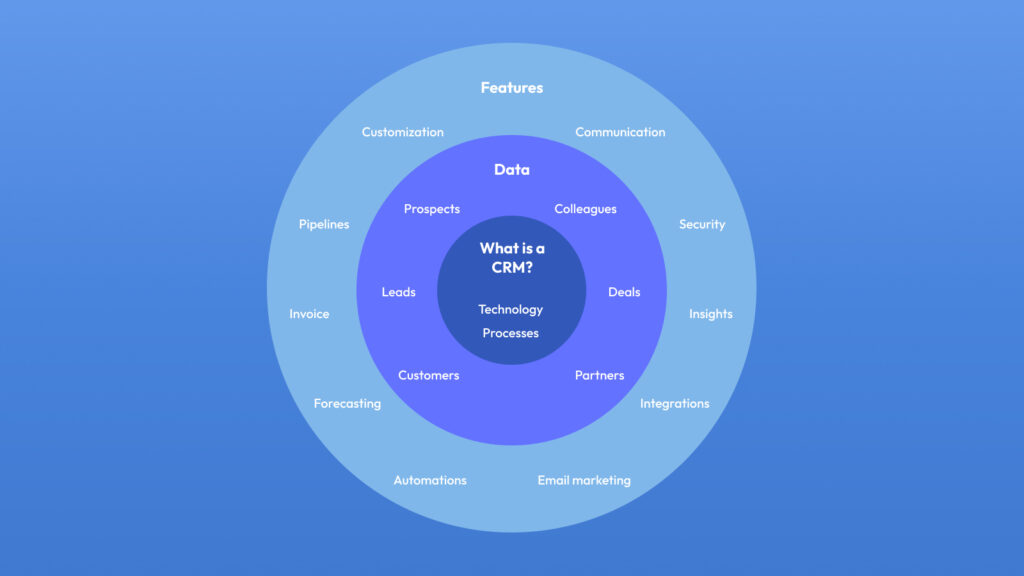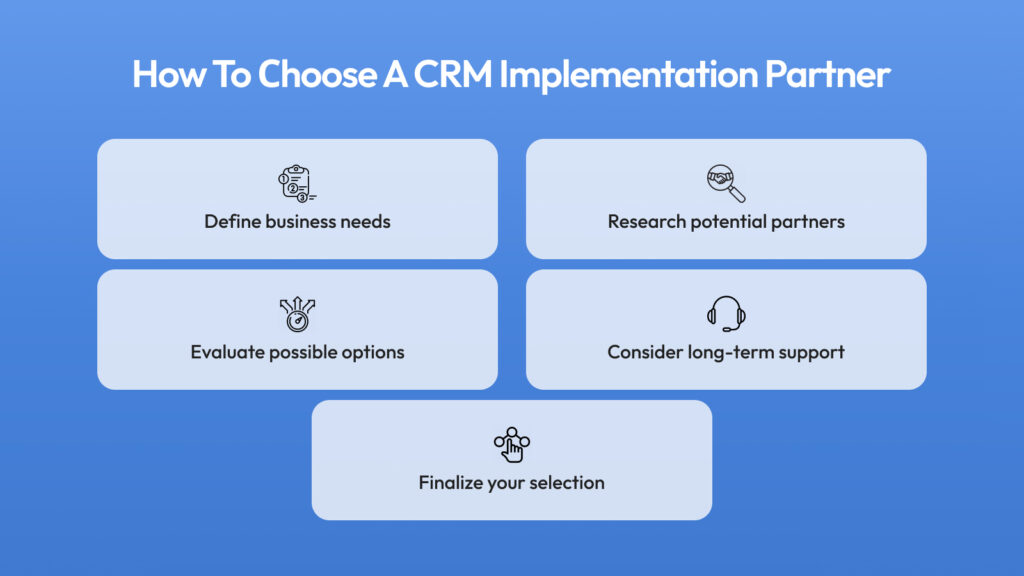Selecting a good CRM implementation partner is vital to your company’s success. An effectively integrated Customer Relationship Management (CRM) system helps optimize processes, boost efficiency, and reduce costs. However, if the selection of a partner is unsuccessful, implementation can lead to a costly and time-consuming disaster. To ensure that you choose the most appropriate partner for CRM system implementation, you must understand the selection criteria, thoroughly research potential partners, and ultimately make an informed decision.
In this article, we will focus on how to choose a reliable partner for CRM system implementation and where to find one. You will also get some valuable tips to help you succeed in this endeavor.
Who a CRM Implementation Partner?
A CRM implementation partner is a professional software development service provider or consulting firm that helps businesses plan, deploy, configure, and optimize CRM systems. The primary role of a CRM implementation partner is to work with organizations to provide the successful integration of CRM software into their business processes.
The core services of implementation partners typically include:
- Assessing business needs.
- Choosing suitable CRM software.
- Customizing and configuring the system to fit specific workflows.
- Migrating data from existing systems.
- Ongoing support and maintenance.
In essence, a CRM implementation partner acts as a strategic ally, guiding businesses on their journey to integrate and maximize the benefits of a CRM system. Their expertise helps organizations leverage CRM technology to improve customer relationships, streamline processes, and increase operational efficiency.
Why do you need a CRM implementation partner?
Collaboration with a CRM implementation partner is essential for effective and efficient deployment. By working with experts, you can get a ready-to-use solution with minimal time and effort on your part. Your partner will customize the solution to meet the specific needs of your business, ensure accurate data migration, assist with employee training, and provide long-term software support. Fruitful cooperation will provide you with maximum return on investment and company efficiency. Thus, a CRM implementation partner ensures a successful CRM system integration tailored to your organization’s requirements.

How To Select A Partner CRM Implementation Consultant
Selecting the right CRM implementation partner is paramount for the success of your CRM deployment. Let’s review the main points to guide your selection process:
1. Understand your business needs
Before you can begin to consider potential CRM implementation partners, you must first be clear about the requirements of your business. Gather information on what processes could benefit from a CRM system and how it would integrate with existing approaches and solutions. Also, identify features that must be included in the solution, such as specialized reporting capabilities or integration with other software applications. This understanding is vital to finding a partner to meet your needs and expectations.
2. Research potential partners
Once you have identified the core features that must be included in a suitable CRM solution, you can start researching potential partners who provide these services. Ensure you look at each provider’s portfolio of work, experience, and customer reviews to assess their competence and reliability. Additionally, consider their pricing models—whether they offer fixed-price packages or custom quotes—to ensure their services fit your budget.
3. Evaluate options
When evaluating potential partners for CRM implementation, specific criteria should be considered before deciding. These include the partner’s expertise in the industry, skills to customize the solution according to your organization’s requirements, capacity for scalability and growth, and cost-effectiveness of their services overall. Analyze each option carefully based on these factors before deciding which is best suited for you.
4. Consider long-term support
Once you have selected an appropriate partner for CRM implementation, it is essential to consider what kind of post-deployment support they offer in terms of training users on new systems and troubleshooting any issues that arise after launch day, as well as maintaining an ongoing relationship with them throughout the lifetime of the system. A good partner will dedicate significant resources to ensure continued success through regular monitoring and optimization activities, so inquire about this before signing a contract.
5. Finalize your selection
After evaluating all options against the abovementioned criteria, it is finally time to choose one partner to implement your CRM system successfully! Opting for a reliable provider who understands your project goals while offering competitive prices will set your organization for long-term success with its digital transformation initiatives.

Where To Find CRM Implementation Partners
When searching for CRM implementation partners, various avenues offer valuable insights and connections. Online directories, such as Capterra and G2, specialize in listing CRM implementation partners and provide reviews and ratings. Review sites like Clutch and TrustRadius also offer firsthand experiences shared by businesses collaborating with CRM consultants. These platforms are comprehensive resources for understanding a partner’s reputation and capabilities.
Certified partner programs offered by CRM software providers, including Salesforce, HubSpot, and Microsoft Dynamics, are another fruitful avenue. These programs showcase consultants with specific training and certification for implementing these CRM solutions. Networking at industry events, conferences, and professional associations effectively garners recommendations and insights into reputable CRM implementation partners. Referrals from peers and colleagues and exploring consulting firms specializing in CRM solutions further enrich the pool of potential partners.
Job boards, freelance platforms like Upwork, and industry-specific forums and communities provide opportunities to discover skilled CRM consultants. For a localized approach, tapping into local business networks, chambers, and associations and collaborating with educational institutions that offer CRM courses can yield recommendations. Exploring the official websites of CRM software vendors and leveraging social media platforms, particularly LinkedIn, for professional networking are additional strategies to identify and connect with CRM implementation partners. Thorough vetting of potential partners based on their track record, industry focus, and compatibility with business needs is crucial for a successful collaboration.
Tips for Successful CRM Integration into Your Organization
Integrating a CRM system into your organization requires careful planning, clear communication, and strategic execution. We’ve compiled some helpful tips to help optimize the process for best results.
Define goals and needs. First, clearly articulate the integration goals and understand what tasks and problems you want to solve. This step will help you save time for further integration and immediately get the right results.
Get management buy-in. Enlist leadership buy-in to ensure commitment and resource allocation. Outline a clear integration plan and intended outcomes that will help you attract additional investment.
Choosing the right CRM. Choose a CRM system that meets the organization’s unique needs and goals. You can research the market to purchase an off-the-shelf solution or contact an experienced software provider who will build a custom CRM to meet your organization’s needs.
Training and change management. Invest in comprehensive training programs to equip users and address change management issues effectively. Programs can include text-based guides, video tutorials, or live training sessions.
Customization. Customize your CRM system to blend with existing business processes for optimal alignment. Include only those necessary functions for your company’s functioning and avoid loading unnecessary ones.
Develop integration protocols. Ensure seamless data exchange between the CRM system and existing tools. Prioritize accuracy and organize data migration to maintain data integrity.
Implement in phases. Implement functionality gradually to ease the transition and allow users to adapt. Moreover, if you choose custom development, gradual implementation will save you the initial investment.
Regular review and optimization. Periodically evaluate CRM performance and make improvements to increase efficiency. Collect feedback from employees who use the system regularly to get their opinions on opportunities for modifications and bug fixes.
Establish KPIs. Define KPIs and metrics to measure the success of the integration. Monitor them continuously to evaluate the effectiveness of the KPI implementation and make changes as needed.
Comply with data privacy regulations. Ensure your CRM implementation complies with data privacy laws to ensure secure operations. Depending on your industry, these regulations may vary, so when discussing integration with your partner, pay special attention to this issue.
Celebrate milestones. Celebrate achievements throughout the integration process to foster a positive organizational culture.
Following these guidelines increases the likelihood of a successful CRM integration, positively impacting customer relationships, operational efficiency, and overall organizational success.
Conclusion
Choosing the correct CRM implementation partner is crucial for a successful integration that improves customer relationship management and overall organizational success. By carefully assessing factors like industry expertise, legal compliance, cost-effectiveness, and client feedback, businesses can select a reliable and experienced partner aligned with their goals. Using best practices, such as setting clear objectives, investing in training, customizing the system to fit business processes, prioritizing data accuracy, emphasizing user adoption, defining success metrics, and offering ongoing support, enhances the chances of a successful CRM integration.
Author’s bio
Yuliya Melnik is a technical writer at Cleveroad, an application development company in Ukraine that specializes in CRM system development services. She is passionate about innovative technologies that make the world a better place and loves creating content that evokes vivid emotions.

